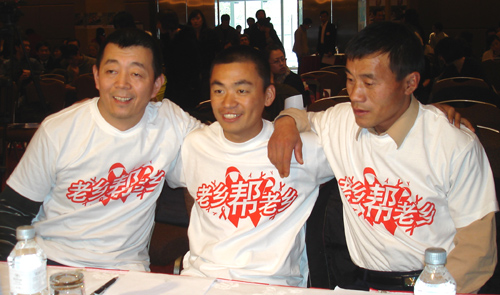By Wang Zhiyong
China.org.cn staff reporter
A short film (video) about an HIV positive construction worker won the hearts of the audience at its launch ceremony on November 25, 2008. The film is the centerpiece of an HIV/AIDS prevention campaign targeting migrant workers.
The Chaplinesque film tells the story of Zhang Xiaohu, a construction worker shunned by his co-workers and friends because he has HIV. Cannes Film festival winner Gu Changwei directed, and leading movie star and former migrant construction worker, Wang Baoqiang, who comes from the same town as Zhang, appears as himself to promote the message of tolerance, acceptance and safer sex among migrant workers. In the end Zhang is accepted by his co-workers and the townsfolk.
|

|
| Zhang Xiaohu (right), together with director Gu Changwei (left)?and movie star Wang Baoqiang (middle)?are posing for photos at the launch ceremony of a HIV/AIDS prevention campaign targeting migrant workers in Beijing on November 25, 2008. Photo by Wang Zhiyong/China.org.cn |
It is the first time that a real HIV carrier has appeared in a public service film produced in China. Zhang, who was infected with the AIDS virus in 2002, won unanimous praise of the audience for his unprecedented bravery.
"I have suffered a great deal from the stigma towards AIDS carriers, and more people are getting infected because of a lack of awareness of the risks. What should we do? Someone has to stand up and be counted. I know I am helping the public. I am proud that, as a Chinese person I am doing what I can to help my homeland." Zhang's words spoken in a strong rustic accent won prolonged applause.
The film was screened to the public for the first time on November 25 at the launch ceremony of China's first HIV/AIDS prevention targeting migrant workers in Beijing. The campaign was jointly launched by the International Labor Organization (ILO) and the State Council AIDS Committee.
The multi-media campaign aims to reduce stigma and discrimination, and encourage safer sexual behaviors among male migrant laborers, particularly those working in construction, mining, and transportation.
It is part of an ILO programme on HIV/AIDS carried out in partnership with China's Ministry of Human Resources and Social Security, the All China Federation of Trade Unions, the China Enterprise Confederation and China HIV/AIDS Media Partnership (CHAMP).
The film will be broadcast by the media members of CHAMP. China.org.cn is proud to be a member of CHAMP.
"China has about 200 million migrant workers, which is over 10 percent of the country's population. They are amongst the vulnerable when it comes to the risk of contracting HIV", said Ms. Constance Thomas, the director of International Labor Organization in China.
"Migrant workers play a major role in China's employment market. They are the backbone of the economy and we must give them all the support we can," said Ms. Constance.
ILO research shows that rural migrant workers hold significant misperceptions about HIV transmission and prevention. Some engage in high-risk behaviors such as commercial sex without condoms, and injecting drugs. Negative attitudes towards people living with HIV are also pervasive among migrants. One CHAMP survey showed that 7 out of 10 respondents would not want to work with a person who is HIV positive.
Some 700,000 people are living with HIV in China, according to the Ministry of Health. Over half of them contracted the virus through sexual activity. The government is increasingly placing emphasis on protecting rural migrant workers from HIV infection to prevent HIV from shifting from high-risk populations to the general public.
(China.org.cn November 26, 2008)